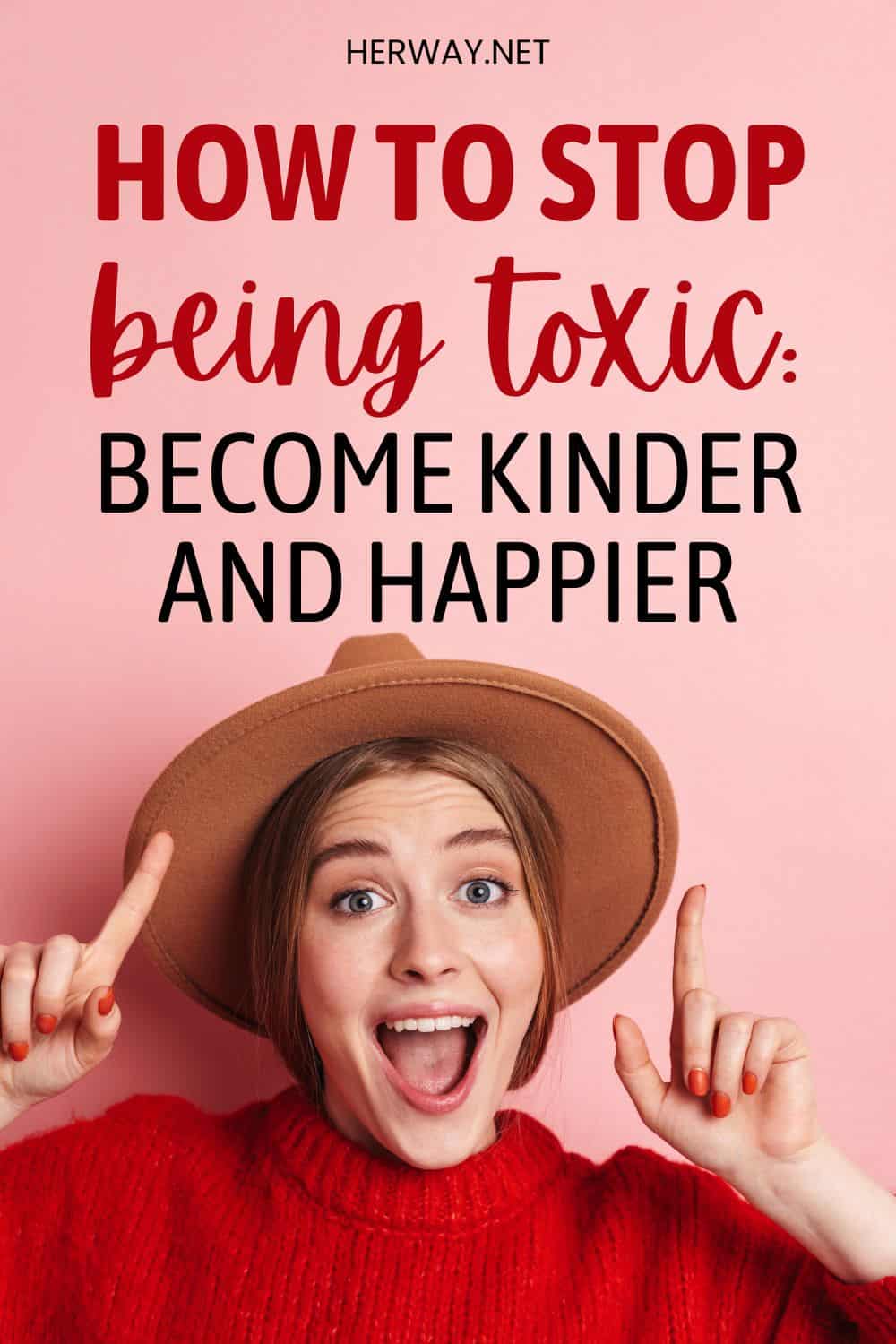How To Stop Being Toxic: Become Kinder And Happier
Most people don’t intend to do things that hurt people, but it happens to all of us anyway. If you repeatedly find yourself in situations that escalate, and you end up behaving in a toxic way, there are probably some underlying issues making you act like that.
The good news is that if you’re trying to find out how to stop being toxic, you’re aware of the problems in your behavior patterns and want to change. Realizing that you do things that hurt others – knowingly or unknowingly – is only the first step. Admitting it and deciding to do something about it is much more important.
If you’re serious about changing and becoming a kinder and happier person, nothing can stand in your way of achieving it. There will be setbacks, and you’ll make mistakes, but as long as you don’t give up, you can get rid of your toxic habits and create new ones.
How To Stop Being Toxic: 13 Steps To Freedom
Being on the receiving end of toxic behavior is painful, but doing it feels no better. The fact that bad behavior feels bad on both ends doesn’t justify it – but it can be what inspires someone who hurts people to change.
Can something small and insignificant trigger you and make you explode at someone? Do you always look for excuses for the hurtful things you do? Is someone else always to blame for your problems?
If you’re aware that you have these and similar thought and behavior patterns, you’re also aware that they’re toxic. We all have bad days when we’re grumpy and irritable. If these days are more frequent than neutral or good ones, there’s a problem that needs to be addressed.
During episodes of toxic behavior, you might feel like you have no control over your actions, but you know that when it’s all over, you’ll feel guilt and self-loathing. You don’t want to hurt people, but you feel like you can’t help yourself in the heat of the moment.
If this describes you, here’s how to stop being toxic.
1. Acknowledge your behavior

By simply looking up how to stop being a toxic person, you’ve already begun the journey to self-improvement. Even if you’ve only just realized that there’s a problem with your behavior and haven’t made any changes yet, you’re miles ahead of where you were yesterday.
It might take time to make any real moves, but the road to changing your behavior starts with self-awareness. Accepting that you’re someone who has hurt people isn’t easy.
Acknowledging your behavior and realizing that you genuinely don’t want to act in a toxic manner anymore is how you actually make the decision to do better. Once you admit to yourself that you’re toxic and that you don’t want to be is when you start moving away from a negative personality towards a kinder, more loving one.
The change won’t happen overnight – you’ll fall into old habits a few times, but as long as the willingness to be less toxic is present, you can return to the right path towards inner peace and healthy relationships.
2. Explore the reasons behind your actions
What’s the reason for your toxic behavior? Toxic traits and behaviors like gaslighting, jealousy, narcissistic tendencies, comparing yourself to others, or controlling behavior are often caused by insecurities.
When they struggle with low self-esteem and lack of self-worth, some people turn to toxic behavior because they don’t know how to cope with their feelings. Negative feelings about your own value and insecurities are the most common cause of toxic behavior.
Another reason people lash out is because they feel unhappy with their lives. If you don’t like your job or relationships, if you have problems or are generally unhappy with where you’re at in life, your way of dealing with it might be to resort to toxic behaviors instead of working on what you can change.
Carefully examine your emotions and circumstances to find out what’s at the root of your actions. When you’re able to pinpoint the origin of your negativity, you will be able to start dealing with it.
3. Start working on your insecurities and problems

After you identify the root cause of your toxic behavior, if you’re truly determined to make your life better, you must start dealing with it.
How you act towards other people is caused by your attitude to your own life. Once your satisfaction with how you live increases, being a kinder person will become easier.
The two most important things for your well-being and mental health are self-love and self-care. You must accept that you have value as a human being and do what’s best for you. This goes beyond just pampering yourself or being gentle with yourself. On the contrary, it means having the determination to do whatever it takes to improve your life.
Loving yourself means accepting who you are and making peace with it. It doesn’t mean that you should stop growing, only that you have to appreciate yourself and your feelings and treat yourself like someone you love: by doing things that are good for you.
This is what self-care is about. Sometimes it means taking it easy and stopping for a moment, but sometimes it means making yourself get up and do what you have to do. It relies on being able to recognize and meet your needs and tell genuine wants apart from momentary satisfaction.
4. Accept responsibility for your behavior
Shifting blame is a component of toxic behavior. When you blame others for your life, your actions, your problems, or anything else, you’re refusing to accept that you make choices that have consequences.
You must deal with the fact that the reason for your behavior isn’t that you’re a victim of your upbringing, your circumstances, or the other person. It’s only you who decides what you do and how you act. Even if you’re in a toxic relationship with another toxic person, neither of you is to blame for the other’s actions.
When you fully understand this, you will gain power. If it’s you who is responsible for your choices, it means that you have the power to choose differently. Nothing is making you act a certain way, and it’s up to you to decide how to approach any person or situation.
You can decide to be kind to your loved ones, see the good in people, and start each day with the commitment to improvement – when you accept responsibility for your behavior, all of these things are in your power.
5. Make a conscious decision to do better

After you find out why you’re toxic, and while you’re doing things to change those reasons, you can immediately start focusing on changing your behavior.
This means consciously deciding to stop being toxic and committing to developing new, positive habits instead. Identify when and in what ways you act toxic and consciously decide to stop yourself when you do.
For example, if you know you’re jealous, manipulative, dishonest, attention-seeking, confrontational, or there’s another of the many possible harmful behaviors you’ve recognized in yourself – when you feel like you’re about to do it, make your best effort to stop.
It’s unavoidable that you’ll experience moments when old habits spring up. It takes a while to adopt new ways of thinking and doing things, no matter how determined you are.
Don’t be hard on yourself if you stumble, but also don’t let it be the first step towards giving up. Simply accept that it happened, apologize if you owe it to someone, and keep going.
6. Set and respect boundaries
Set boundaries to protect yourself and respect other people’s boundaries so that they feel safe around you. Boundaries are absolutely necessary for your mental health and well-being. Defining your boundaries to tell other people how they can act around you so that you feel secure is a foundation for healthy relationships.
Toxic behavior often includes an unwillingness to respect other people’s boundaries. If your toxic traits include crossing other people’s boundaries, you must work on it. Listen when other people inform you of their boundaries and accept where their limits are.
An important thing to keep in mind about boundaries is that they change. Something that was okay with you in the past doesn’t have to be okay right now. This applies to other people as well. This is why it’s important to communicate and respect each other’s words and feelings.
7. Let things go

Realize that you don’t have to react to everything. People sometimes say things for no reason, and if one of your toxic behaviors is to have an intense reaction to other people’s words and actions, find a way to sometimes let things go.
Often, unimportant issues cause problems and arguments. Think before you react: are other people’s actions and words genuinely problematic, or are you just irritable at the moment? Stop criticizing others for every single thing you don’t like about them. Instead, accept them as you are.
If your goal is to stop being toxic, you must let go of the idea that you’re always right. Not only that, but you must learn to compromise, even in situations when you actually are right. An important piece of relationship advice you should always remember is that, at the end of the day, losing an argument is better than losing a person.
8. Focus on the positives
Your thoughts impact your feelings and your actions a great deal. Negative thoughts are often behind toxic behavior. Seeing things in black-and-white, generalizing, labeling people, and judging situations by your emotional reactions to them can all greatly impact how you act.
Learning how to deal with negative thoughts and instead focusing on the positive sides of people and situations can have a major effect on how you feel and act. You’d be surprised by how powerful clear intent to focus on the positives can be. By choosing to see the good in everything, you’re increasing your chances of the good happening.
An optimistic outlook makes it less likely that you’ll react in a negative way when interacting with other people. If you choose to expect good vibes from someone, you won’t judge them from the start, but instead, try to see where they’re coming from.
9. Consciously practice kindness

Kindness is the opposite of toxicity – when you consciously choose to treat people with compassion, there’s no place for toxic behaviors.
Instead of trying to guilt trip, manipulate, control, judge, or criticize people, choose to understand, support, and accept people and their feelings.
Learn to understand others’ feelings and develop empathy. This approach will dramatically change your relationships with anyone you come into contact with.
When someone is accidentally rude to you, a toxic reaction might be to immediately get angry and argue with them. This inevitably leaves both you and the other person irritated, exhausted, and your day ruined.
Conversely, if you respond to the other person’s rude behavior with kindness, you’ll stop them in their tracks and make them change their demeanor. If you choose to think about where this person is coming from, your understanding can turn the situation around.
You won’t get angry, and there will be no argument. By choosing kindness, you didn’t act in a toxic manner, and your day isn’t ruined.
10. Expect kindness
Being kind to others can profoundly change your attitude and relationships. But did you know that if you always anticipate that others will be kind to you as well is equally as powerful?
When you offer kindness and assume that it will be returned, you won’t see a reason to behave in a toxic manner. Give people the benefit of the doubt. Even when they make mistakes, assume that they intended to be kind.
Most people judge themselves by their intent and others by the effect of their actions. If you hurt someone and didn’t mean it, you’ve still hurt them. You can flip this idea and assume that when people do something you might not like, their intent wasn’t to hurt you.
Hostility and judgment are some signs of toxic behavior. Choosing to react with understanding instead of assuming they did something on purpose gives you a chance to get to know them better and deepen your relationship.
11. Be more vulnerable

Toxic people are often driven by their egos. Be honest about your feelings instead of refusing to admit anything you perceive as a weakness. Don’t insist on maintaining a picture of how you should act or be. Instead, be sincere and show who you really are.
If you’re used to wearing a mask, learning how to show vulnerability will be difficult but ultimately life-changing. To stop being toxic, remember that continuing to pretend that you’re something you’re not will make it impossible to develop truly deep relationships.
Putting your ego first is toxic because it stops you from growing and developing. Show people your flaws instead of hiding them at all costs. Of course, it’s okay to keep an appropriate distance with co-workers, but when spending time with friends, family members, or anyone else you’re close to, don’t hide.
12. Communicate better
One of the signs of a toxic person is that they don’t communicate in a straightforward manner. It’s vital that you learn healthy communication if you want to stop being toxic.
Being direct, honest, and willing to compromise is the difference between healthy and unhealthy relationships. Toxic communication is the opposite of this. If you work on dealing with your toxic traits, handling communication problems will become easier.
As long as you’re not trying to one-up your conversation partner and instead connect with them, you can avoid toxic communication, such as:
• Blame.
Instead of rushing to blame the other person for your feelings, calmly explain why you feel a certain way. If something bothers you in the other person’s behavior, let them know without making them feel guilty about it. Choose to understand instead of blame.
• Not listening.
When you’re communicating with someone, pay attention to them and them only. Don’t allow your mind to wander, and don’t let yourself be distracted. If you’re only waiting on your turn to speak instead of actually listening to what they’re saying, you’re not giving the other person a chance to have their turn.
• Being defensive.
This is related to not being able to take responsibility. If you stop listening and become defensive when talking to someone and they mention your actions, it means you see their comments as a threat.
• Sarcasm.
Sarcasm intended to mock is a form of emotional abuse. Avoid using it unless it’s clear to everyone that it’s good-natured and its purpose isn’t to hurt anyone. Even if you don’t use sarcasm in a malicious way, avoid it because some people take things at face value. It can be especially harmful on social media, where the tone is difficult to determine.
• Gaslighting.
Gaslighting is a toxic manipulation technique that you might not even be aware you’re using. The purpose of gaslighting is to establish control by making someone question their judgment. Some behaviors that you might not even realize count as gaslighting are talking about the other person’s past mistakes to make your point, playing the victim, or comparing them to someone else.
• Passive-aggressive behavior.
Not saying what you mean, the silent treatment, and stonewalling are all examples of passive-aggressive communication behaviors. People usually do this because they think the other person should already know how they feel without being told, which is always a mistake in communication.
• Not admitting your mistakes.
Apologize quickly and sincerely when you’ve done something wrong. This is the best way to deal with whatever happened and put it behind you. Some people would rather break up than apologize, putting their egos ahead of everything else, which is a clear example of toxic behavior.
13. Practice mindfulness

Toxic behavior is often at its peak in the heat of the moment when you become overwhelmed with anger and can’t stop yourself from acting in a way you know you’ll regret as soon as it’s over.
Regularly practicing mindfulness will help you recognize your negative thoughts and become aware of what you’re doing even when you’re feeling upset. If you want to stop your toxic behavior in its tracks, mindfulness can be helpful in teaching you to focus on the present moment.
Mindfulness means being fully present and aware of your feelings and actions instead of being provoked by whatever is happening around you. The more you practice, the easier it becomes. Becoming able to stay in the moment will help greatly reduce toxic behavior caused by anger.
Being aware of your surroundings and your reactions, as well as being able to handle them, will greatly reduce toxic reactions that come up when you’re overwhelmed. When you observe the moment instead of letting yourself explode, you’ll be able to control your reactions.
In Summary
If you’ve decided to find out how to stop being toxic, it means you’re aware of your behavior. This is a great sign that you want to change, and when people want something, they make an effort to achieve it.
To stop your toxic behavior, start by getting to the bottom of what causes it. For most people, it’s caused by insecurities and unhappiness.
Once you begin to deal with this and focus on your wellness, you’ll be able to consciously stop yourself from being toxic in your daily life.
This process is by no means easy, but if you persevere and keep working on being kinder to yourself and to others, you’ll develop healthy habits that will help you form healthy relationships.








